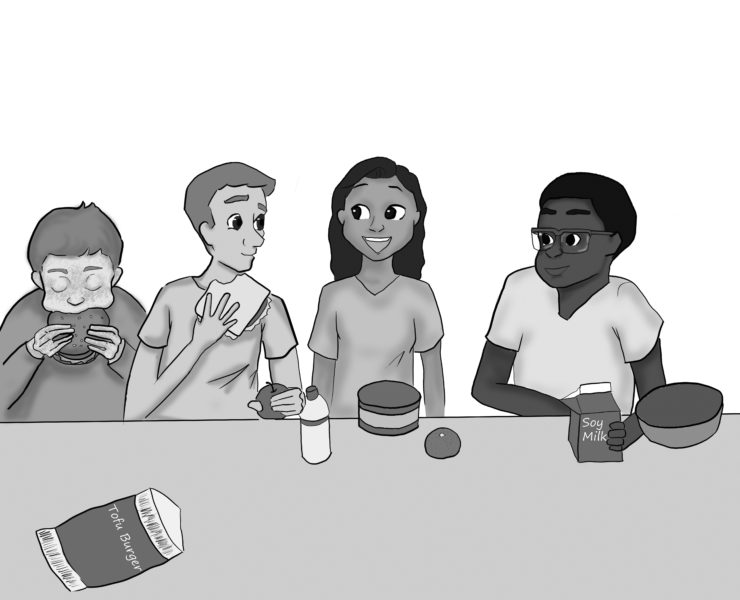

These unconventional eating habits such as being vegan, having an allergy or a religious belief affects individuals, not only in regards to their food, but possibly with their adjustment, social lives, well-being and much more.
Unconventional eating habits result from a wide range of reasons. For some it’s necessity, while for others it’s more of a personal decision. For senior Meghana Gadiraju it’s a mix of various reasons. “I’m anemic, (iron deficient), so whenever I take the supplements for that I have to make sure I don’t have caffeine or fiber [or calcium] within two hours of each dosage just because it can interfere with it. Also, I grew up Hindu, so I’m not supposed to eat beef or pork. I mean I do, but I didn’t for a long time when I was little.”
The owner of Que SeRaw SeRaw, Kerry Bitner, a take-and-go vegan store in Burlingame, adds that for her it has been mainly three things: health, morals and mainly the Earth’s sustainability. “The main thing is for environmental reasons. If you read some of the research on greenhouse gases, water waste and land waste, and all those things that go into industrial agriculture for meat products, it has a much higher environmental impact than almonds, soy, potatoes, vegetables and fruits and the sort of things vegans eat to replace the meat.”
When people start to follow unconventional eating habits, they have to make sacrifices, which causes them to miss certain foods. Sophomore Melinda Ma, who is dairy-intolerant says, “Of course I miss a bunch of different foods. Almond cheese is not the exact same as regular cheese and coconut ice cream is not exactly the same, but it’s still really good. Often times when I see other people eating [the food I can’t eat], I’m like, “Aw,” and I’m sad that I can’t eat it.”
Ma then talks of how she then came to accept her diary intolerance, “At first I was kind of sad about [being dairy-intolerant] and I was trying to do the lactase pills, but even after the symptoms started to come back, I still was using the lactase pills hoping that they would work. At first I didn’t really accept that I couldn’t eat [dairy] at all, but after I realized that there were so many substitutes out there, I accepted it.”
With food being such as integral part of people’s’ lives, it’s bound to play a role in countless other aspects, even socially. Sophomore Anisha Tripathi, who is vegetarian, says, “When my friends want to go out to eat and I’d go with them, I have to make sure we’re getting something vegetarian friendly. When I went to [Harvard Model Congress], I couldn’t get dim sum with everyone because there’s not that much vegetarian food.”
Being in the unconventional eating business, Britner has learned a lot about people’s opinions on food and of their importance. “There’s such a range of people that come [to my store] and I learned that food is a really sensitive topic and people have beliefs and sometimes it is hard to get people to change whatever their beliefs are and that issues from food are tied up with a lot more than just scientific information. I guess I’ve just learned that you really have to be sympathetic and sensitive to everybody’s food philosophies.”
Unconventional eating habits show people that food is such a vast and encompassing component in people’s lives and have different meanings in people’s lives. These diets can be a way for people to try something new and, in the process, develop their own, unique food philosophies.



